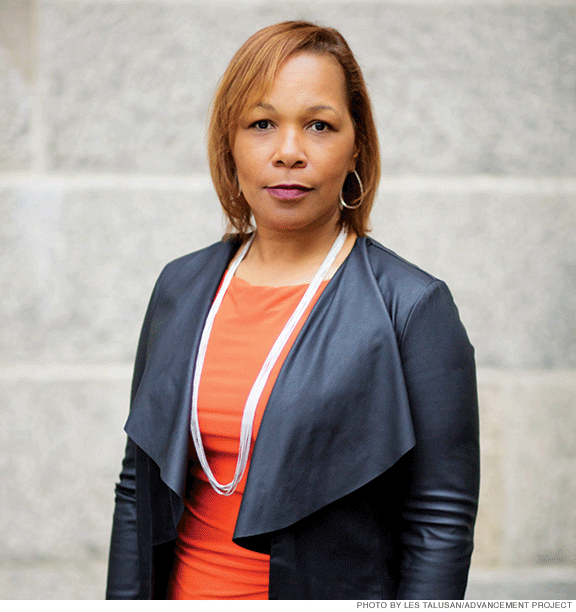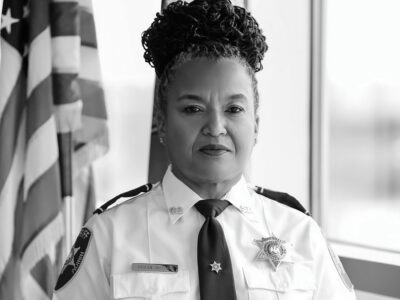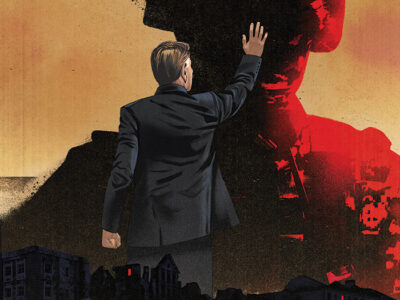
For the last 20 years, the attorney-turned-activist has aimed to advance civil rights through her nonprofit organization, the Advancement Project.
In August 2005, when Hurricane Katrina ripped through New Orleans, swallowing up the city home by home, Judith Browne Dianis W’87 sat in front of her TV for several days, absorbing the news reports and crying.
“I was watching my people being left in the floodwaters to die and feeling helpless, not knowing what to do,” she says. “But then I kicked into gear pretty quickly.”
Dianis has never been one to wallow when she could take action instead. She discovered the power of protest as a student at Penn and has continued to fight injustices ever since, first as a civil rights attorney and now with the Advancement Project, a nonprofit she helped found in 1999 and has steered through some of the most prominent civil rights battles of the last 20 years.
Billing itself as “a next generation, multiracial civil rights organization,” the Advancement Project aims to eliminate racism and empower people of color. As the executive director of its national office in Washington, DC, Dianis leads the nonprofit’s efforts to connect local movements with the legal, communications, and organizing resources they need to make real change.
Though she’s been with the Advancement Project since it started, Dianis wasn’t yet its executive director in 2005. Still, she helped spearhead its post-Katrina work, linking up with other attorneys and filing lawsuits meant to protect some of the city’s most vulnerable residents—from a suit to stop the city from bulldozing homes in the Lower Ninth Ward, a majority black neighborhood where many people lived in poverty, to one protecting displaced residents from eviction.
They won some and lost others, but whatever the individual outcomes, Dianis saw the bigger picture. “We were lifting up the voices of people who the city didn’t want to come back and who were just being erased in the reconstruction process,” she says. “Even [in the lawsuits] we didn’t win, we sparked a debate.”
Since then, Dianis has led the Advancement Project in ongoing work to enforce voting rights, champion immigrant justice, and, at the moment, pull uniformed police officers out of schools.
From as far back as she can remember, Dianis says, race was “always a conversation” inside her childhood home in Queens. And with a mother who was an educator and activist and a father who had served in the Army when it was still segregated, there was plenty to discuss.
Dianis, meanwhile, was living through her own transformative experiences at the time.
As part of a voluntary busing program in the 1970s and early ’80s, she was shuttled from her predominantly black, middle-class neighborhood to largely white schools in nearby neighborhoods. Her two worlds collided when she was 14 and tensions exploded between her middle school and a mostly white high school nearby. The older white kids came and rocked the buses that she and other black students rode to school, trying to flip them over. An after-school race riot loomed. Dianis convinced her principal to send everyone home early.
“That was an eye opener,” she remembers. “We talk about the South, but that was a time in New York City that people were outwardly showing their racism. It was a time when people knew there were certain areas that if you’re black, you just don’t go into.”
Her activism took full flight at Penn, where she majored in marketing while leading protests against a professor who she says made racist remarks in his classroom, against a campus police force that demanded she and her friends show their IDs while sitting outside the high-rises one day, and for Penn’s trustees to divest from apartheid South Africa.
“I found my political voice at Penn and Columbia,” she says. Spearheading campus protests—including a student takeover at Columbia Law School to demand more racial diversity among faculty—“showed me the importance of organizing and how unity and collective action means power, and power is everything.”
She went to work for the NAACP Legal Defense and Educational Fund after law school and stayed there for five years, fighting against discrimination in housing and employment while championing voting rights.
“The courts were moving to the right, so it wasn’t the best time for civil rights lawyers to do the kinds of big, sweeping changes that had been done in the past,” she recalls. Soon Dianis began to realize that she and other attorneys could more effectively foster change if they linked up with local movements and grassroots organizers and offered them support. That realization led her straight to the Advancement Project.
When she joined the nonprofit in 1999, her work to dismantle the “school-to-prison pipeline” started right away—a precursor to her current focus on police presence in schools. At first, she and her coworkers only knew that “there were communities that were struggling,” because their kids seemed to be getting tossed out of school in droves.
Soon the magnitude became clearer. Black teens were being suspended or expelled for fighting in schools with zero-tolerance policies, then getting served subpoenas a few days later. Sometimes they even went directly from the classroom to the courtroom.
She spoke with Rev. Jesse Jackson, who pressed her to explore the civil rights implications of these zero-tolerance policies. Soon the musician/activist Harry Belafonte had joined in, telling Dianis that “we can’t allow this to happen on our watch,” she recalls.
“We realized that schools were becoming a direct feeder to the prison industrial complex, and it was because of schools calling in the police for these very minor things,” Dianis says. “We’re now considered pioneers in that area,” she adds, noting that some call her the “godmother” of the movement to end the school-to-prison pipeline.
But even with that moniker, plus a 20-year track record, a $7 million operating budget, a 40-person staff, and involvement from civil rights notables like Belafonte and Jackson, Dianis is still struggling to grow the Advancement Project.
“Over the years, the civil rights community has been very male-driven in terms of the individual leaders who are out front,” she says. “It is often hard to be heard in those circles.” She’s seen progress—lately more women have been stepping into outward-facing roles like hers—but “getting to the next level for my organization is difficult,” she says, “and I think that is because there’s a black woman running it. But we just keep doing the work. That’s all we can do—keep doing great work.”
While Dianis sees this as a particularly challenging moment for civil rights work, she’s also been inspired to watch “people who are the most oppressed, the most disenfranchised, the most impacted fighting back.”
“They’re not giving up hope,” she says, “and I always tell people that we’re in the business of hope. My hope is that we’re building the kind of country we want to see.”
—Molly Petrilla C’06




